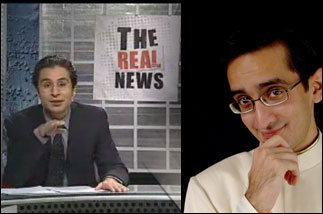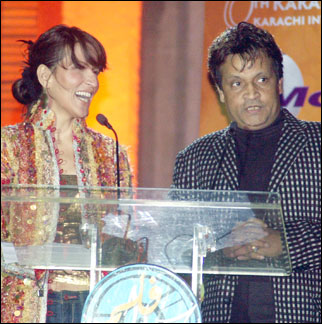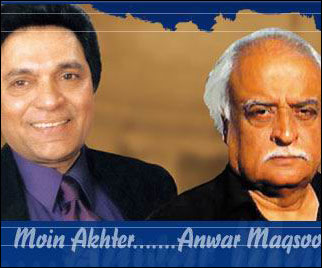|
|
| |
comment
Big laughs on the small screen
Comedy is no longer just about slipping on banana peels, its also
about social and political commentary under the banner of intelligent
humour.
By Sonya Rehman
|
| |
A slapstick series
by the name of Fifty Fifty (which comprised of short acts) gave Pakistani
entertainment-starved audiences something to laugh about in the '80s.
There was just nothing like it. The show was novel and one-of-a-kind
– one that could be related to irrespective of gender, class
or even age group for that matter. Following Fifty Fifty's apex of
success, the road for broadcast comedy was paved further as additional
slapstick shows/serials (both on radio and television), and stand-up
comedians cropped up towards the onset of the '90s.
|
 |
| |
But one stage comic
in particular, Umar Sharif, through his stand-up routines made a definite
mark as one of the most terrific comedian/stage artistes the country
had ever seen. Bordering on the naughty (and at times vulgar) his
jokes were uproariously comical and seemed to have panache for impersonations.
Quick-witted and interactive with the audience, there has never been
a dull moment with Sharif (quite like the Chris Rock of Pakistan)
on stage.
Moin Akhtar too, through his acting prowess (as a comedian) set the
benchmark even higher. From theatre, television serials and more recently
a program known as Loose Talk (started in 2005 till the present) –
which features Anwar Maqsood as the host and Akhtar imitating different
individuals to the T. |
| |
The show is riotously engaging
– where Maqsood's delivery is subtle (albeit comic as an amused
host), Akhtar adds the slapstick touch via his over the top impersonations
that hit very close to home.
But broadcast comedy serials/shows aside and the fact that stand-up
acts (for the masses) are common (since they're delivered in Urdu
or Punjabi); a stand-up routine in English on the other hand, is a
relatively new concept that caters to a very 'exclusive' audience.
In particular, a small troupe calling themselves Black Fish were possibly
the initiators of stand-up acts (with their routines delivered in
English) in the country. Led by Saad Haroon, the troupe's popularity
ascended due to its originality and witty routines. "After three
years of doing Black Fish I wanted to branch out," Saad had said
|
 |
| |
| which eventually
led to the creation of a 'Saturday Night Live' inspired show (for
a local channel) by the name of The Real News. The show – which
consists of Saad Haroon, Danish Ali and Mikael Lotia – is tongue-in-cheek
'slapstick satire' that pokes fun at social norms and the administration.
"We have to be careful with content. God knows how many jokes
we've scrapped," Saad had stressed. "Our focus is on making
people laugh. You can't define 'funny'; everyone has their own approach
to it. What's important is how you get it across," Danish (who
began doing improv in Islamabad with his friends) emphasized. |
| |
| A journalist by profession, Sami
Shah (now an ex-Black Fish member and a full-time stand-up comedian)
finds himself to be more of a "stage person" since the "immediacy
of stage" appeals to him greatly. "With Black Fish we had
corporate sponsors but the trouble with that is that it brands you
and the sponsors expect certain types of jokes," Sami had said
and later adding, "Since it was something I wasn't comfortable
with I decided to self-finance my shows." Although Sami's audience
(just as that of The Real News) is extremely niche, his idiosyncratically
witty sense of humour has resulted in due appreciation since he went
solo starting December 2006. |
 |
| |
Comedy today isn't
what it used to be. What works now is social and political commentary
interspersed with 'intelligent' humour. Comedians slipping on banana
peels or just acting plain retarded will fail to get any laughs or
attention for that matter.
Isn't it interesting though that as music develops (both compositionally
and lyrically), as art progresses (in terms of medium, brushstrokes
and subjects) and that overall, artistic expression continuously undergoes
a certain metamorphosis (with regard to a country's political, economical
and social standing), so does the deliverance of comedy?
Comedy must not be undermined. It is the next best thing after music
in terms of 'change'. For what better way can change be brought about
via a few laughs? |
| |
|

